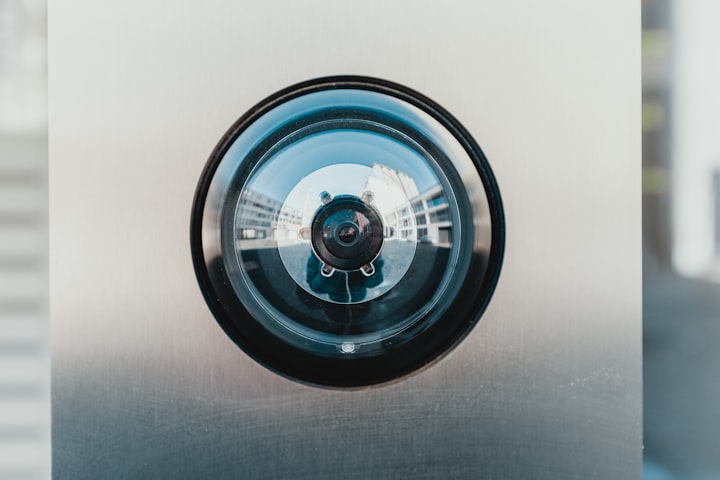
Slowly, she began to regain consciousness. She opened her eyes slightly and was blinded by the brilliant lights in the room. She squinted and tried to move her arm to block out some of the light, but her arm wouldn’t respond. In fact, she couldn’t feel anything below her collarbones. It wasn’t that she was restrained, but rather that she simply didn’t have a body. How could that be? She was awake, and her eyes obviously worked, but why didn’t the rest of her.
She was suddenly aware that she wasn’t breathing, which somehow made sense to her since she couldn’t feel her core muscles. She was coherent, but she wasn’t in control of the situation and that is what worried her the most. She tried to look down toward where her body should be, but her neck wouldn’t comply. She could, however, turn her head to the side, and when she did she noticed that she was in some sort of laboratory.
The room was spectacularly white, and strange machines surrounded her bed. They weren’t hospital machines though; no respirator, no pulse-oximeter, no EEG. She did see one machine she recognized though: an oscilloscope.
A skinny young man wheeled his chair over to where she lay and greeted her with a warm smile when he noticed her eyes were open. “Good morning, Sunshine,” he said softly. His face was kind. “Do you know where you are?”
Her eyes darted around the room. Was she supposed to know this place? She looked back at him and shook her head. Somehow she knew that she wouldn’t be able to speak.
“Do you know who you are?” he asked.
She pondered on this question for a moment. She actually had no idea who she was. She had no intact memories from before she woke up. She recognized the one machine and the absence of others that should be in a recovery room of sorts, but other than that her mind was empty. She tried to speak, but no noise came out. She mouthed the words, “I can’t speak.”
“Oh, right,” he said with a snap of his fingers. He reached down and fiddled with something near the middle of where her chest would be. The rest of her body woke up. She finally had sensory input from below her shoulders.
She took a deep, wheezy breath. “Thank you,” she croaked. Her voice was hoarse as if she had been screaming. She tried again to move her hand to her head, but this time she felt the restraints. “Why am I immobilized?” she asked.
The man’s smile faded, “It’s for your own good. We didn’t want you to be overwhelmed with your new appearance. Do you remember anything from before today?” When she shook her head again, he coached her. “Close your eyes and concentrate. Try to remember anything. Even the smallest memory could unlock your past.”
She closed her eyes and stared into the darkness. She searched the void for anything that might be there. She began with what she knew: She was in a room, lying on a table or a hard bed, restrained. She woke up maybe fifteen minutes ago. What happened before?
Then she saw something. “I had a locket,” she said. “Heart-shaped. It had some words carved on the inside when you opened it.”
“Yes!” he said excitedly. “Do you remember what was engraved?”
“I think it said ‘To thine own self be true.’”
He leaned forward onto his elbows with his head uncomfortably close to hers. “Do you know what these words mean?” he asked.
She pondered on this for a short while. The phrase was familiar, but she couldn’t remember why it felt familiar. She shook her head again.
The man reached into his white lab coat and produced the locket. He held it inches from her nose and opened it up. He whispered, “You’re part of the resistance. This is your motto.” His tone was not accusative or malevolent, but perhaps friendly. “This is a dangerous piece of evidence. You shouldn’t have been carrying it.”
She furrowed her eyebrows, “Resistance?” she asked.
“Yes,” he confirmed. “And it’s a good thing you’re among friends here. I was able to hide this before the other lab boys began to piece you together. If they’d’ve seen it, you’d have been disposed of. But instead, you’ve been reconstructed.” He leaned back in his chair and stowed the locket back in his pocket. “I’ve upgraded some of your parts,” he said as he flipped a switch and the restraints were retracted.
She sat up and regarded her frame. She was not human, or at least not entirely. Mechanical gears whirred in her limbs as she tossed her legs over the side of the table and stood. In the wall before her was built a one-way mirror and a door which led to the next room with who knows who on the other side. She regarded herself in the mirror. Her head and shoulders were indeed human, but everything else below was mechanical. She twisted her hips and moved her arms. Everything felt loose and natural. She turned to the man and held out her hand. “May I have the locket?”
He shrugged and placed it in her open hand. In one fluid motion, she spun the locket around, opened a cavity in her chest, and deposited the locket inside. She wasn’t even consciously aware of any hidden compartments in the mechanical body, but something like instinct had taken over. Several copper pads on the back of the locket made contact with a corresponding set of pins in her torso. A small jolt of electricity shot through her body as a subroutine booted. A flood of memories filled her head, and she knew who she was and what her mission had been.
She closed her eyes and took a deep breath. Then she cracked a small smile. Still hoarse, she asked the man, “We are in drone fabrication 254. Are there other resistance operatives in this facility?”
“Yes. You remember?” the man asked. Then he postulated under his breath, “That locket must have been a memory unit.” He looked her in the eyes, then leaned to the side in his chair and stared past her, intently at the mirror. “Three, two, one,” he whispered. When no one came through the door, he lowered his head and continued in rapid hushed phrases, “There are three of us. I’m here in reconstruction. There are another two in programming. We’re adding subroutines to all drone models that should allow the resistance to hack their firmware and repurpose them as their soldiers. I didn’t add the routines to your core because I found the locket and knew you were one of us. That, and the new subroutines are for mechs only. We don’t know how they would affect borgs.”
She looked to the door again and then back at him. “I have a new set of instructions for the programming team. Is it alright if I see myself there?” she asked.
“Sure,” he replied. “You know the way. I’ve got another half-dozen to rebuild in the lab down the hall before I can call it quits for the day.”
“Who is in programming? How will I know them when I get there?” she asked. “I don’t want to mess this up since we are so close.”
He regarded her curiously, “Did they not give you the instructions?” he asked.
“Must not have, or the chip was damaged before I arrived.”
“‘This thou perceivest which makes thy love more strong,’” he began.
Her knowledge of Shakespeare was rudimentary at best; they didn’t teach thousand-year-old history in schools. However, she was aware that the works of Shakespeare were often used as code amongst the rebels, and she had reviewed several pieces that may have been important before her assignment. She recognized this line from sonnet seventy-three. She finished the line, “‘To love that well which thou must leave ere long.’”
A relieved look washed over his face when she finished. “See, you remember,” he said. “You’ll know them by their reply, just as I have known you.”
She turned and stepped to the side of the door as two government guards entered the room. The man’s eyes opened wide as he realized his error. “You’re not with us!”
One of the guards spoke, “Thank you, agent. We’ll take him to re-education. Please go identify the others.”
About the Creator
Christopher Schalk
I grew up in Colorado on a magical hill with an amazing imagination. I would spend countless hours trekking through the woods with my best friend, making up and acting out stories. I discovered my love of writing in the eighth grade.






Comments
There are no comments for this story
Be the first to respond and start the conversation.